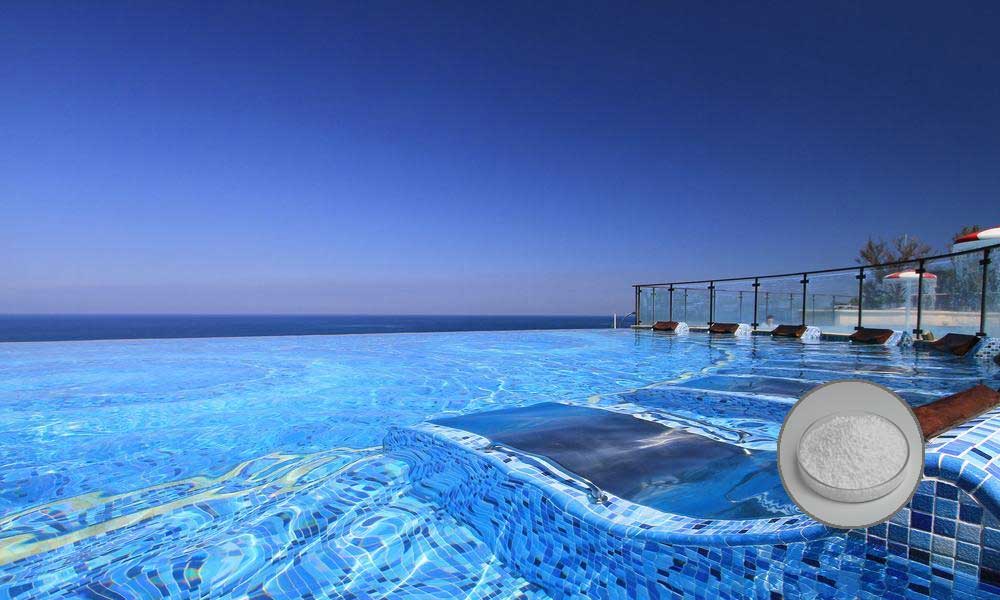Baseinų priežiūros srityje itin svarbu tinkamai naudoti baseinų chemines medžiagas, kad vanduo būtų putojantis, saugus ir viliojantis.Trichlorizocianuro rūgštis, paprastai žinomas kaip TCCA, šioje srityje tapo tvirtu žaidėju. Šiame straipsnyje nagrinėjamas optimalus TCCA naudojimas, atskleidžiant jo privalumus ir geriausią praktiką, kaip išlaikyti nepriekaištingą plaukimo aplinką.
Baseinų chemikalų galia
Baseinai yra atokvėpio ir laisvalaikio šaltinis, tačiau jų higienos palaikymas reikalauja kruopštaus požiūrio. Baseinų chemikalai, tokie kaip trichlorizocianuro rūgštis, atlieka svarbų vaidmenį šiame procese. TCCA, chloro pagrindu pagamintas junginys, yra žinomas dėl savo efektyvumo dezinfekuojant baseino vandenį. Dėl unikalių savybių jis yra pageidaujamas tiek baseinų savininkų, tiek specialistų.
Trichlorizocianuro rūgšties supratimas
Trichlorizocianuro rūgštis tiekiama įvairiomis formomis, įskaitant tabletes, granules ir miltelius. Ši universali cheminė medžiaga vertinama dėl lėtai tirpstančių savybių, kurios užtikrina pastovų chloro išsiskyrimą laikui bėgant. Šis pastovus išsiskyrimas užtikrina stabilų chloro lygį baseine, veiksmingai kovojant su bakterijomis, dumbliais ir kitais teršalais.
TCCA naudojimo pranašumai
Ilgalaikis chloravimas: lėtas TCCA tirpimo greitis garantuoja ilgalaikį chloro išsiskyrimą, išlaikant norimą dezinfekcijos lygį ilgesnį laiką. Tai sumažina cheminių medžiagų dozavimo dažnumą ir supaprastina baseino priežiūrą.
Daugiafunkciškumas: Be pagrindinės dezinfekavimo priemonės funkcijos, TCCA veikia kaip oksidatorius, skaidantis organines medžiagas ir neleidžiantis susidaryti chloraminams – junginiams, atsakingiems už būdingą „chloro kvapą“.
Stabilumas: TCCA pasižymi puikiu stabilumu esant skirtingoms vandens sąlygoms, įskaitant aukštą temperatūrą ir pH svyravimus. Šis stabilumas prisideda prie jos patikimumo.Baseino chemija.
Geriausia TCCA naudojimo praktika
Tikslus dozavimas: Labai svarbu tiksliai dozuoti TCCA. Vadovaukitės gamintojo nurodymais, kad nustatytumėte tinkamą dozę pagal savo baseino dydį ir vandens tūrį. Perdozavus gali susidaryti per didelis chloro kiekis, o per mažai dozavus – nepakankamas dezinfekavimas.
Lėtas tirpimas: Įdėkite TCCA tabletes arba granules į plaukiojantį dozatorių arba nugriebtuvą ir leiskite joms palaipsniui ištirpti. Venkite dėti jų tiesiai į baseiną, nes tai gali sukelti vietinę chloro koncentraciją.
Reguliarus stebėjimas: Stebėkite chloro kiekį naudodami bandymo rinkinius. Palaikykite chloro koncentraciją rekomenduojamame diapazone, kad užtikrintumėte optimalią dezinfekciją ir vandens skaidrumą.
Subalansuotas pH: TCCA veiksmingumui įtakos turi pH lygis. Optimaliam veikimui palaikykite baseino pH nuo 7,2 iki 7,6. Reguliariai tikrinkite ir prireikus pakoreguokite pH.
Saugos priemonės: TCCA yra stipri cheminė medžiaga. Su ja elkitės atsargiai, dėvėdami tinkamas apsaugos priemones. Laikykite vėsioje, sausoje vietoje, toliau nuo saulės spindulių ir kitų cheminių medžiagų.
Baseino chlorasyra tvirtas baseinų higienos sergėtojas, įkūnijantis efektyvumą ir patogumą. Suprasdami jo savybes ir laikydamiesi geriausios praktikos, baseinų savininkai gali panaudoti jo galią, kad palaikytų saugią ir patrauklią vandens aplinką. Dėl lėto atpalaidavimo savybių, daugiafunkciškumo ir stabilumo kelionė link nesugadinto baseino vandens tampa sklandžia ir naudinga veikla.
Įrašo laikas: 2023 m. rugpjūčio 21 d.


